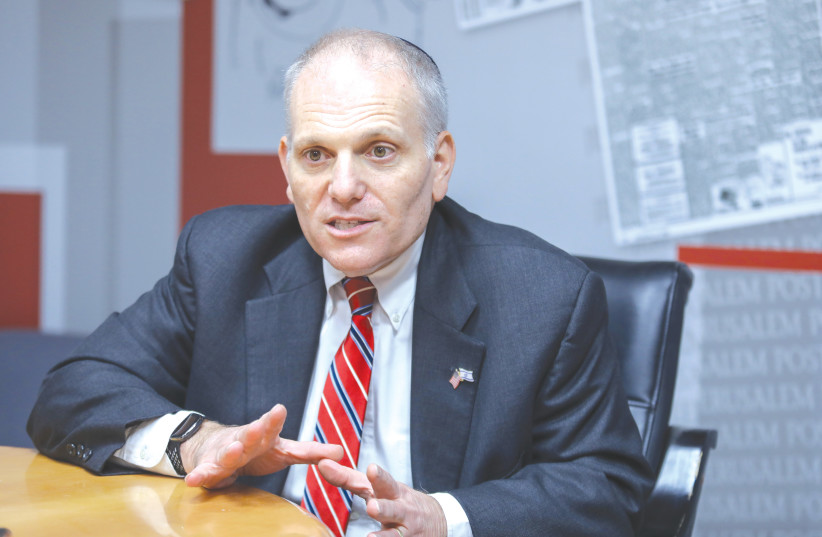Although Israel is now open to tourists, Diaspora Jewry and its leaders were highly critical of the country’s decision to close its borders to all visitors from November 28, 2021, to January 9, 2022, in an attempt to halt the Omicron variant.
Two prominent Diaspora leaders, William Daroff and Malcolm Hoenlein – the CEO and executive vice chairman of the Conference of Presidents of Major American Jewish Organizations – spoke out at a meeting with editors and reporters from The Jerusalem Post and The Jerusalem Report on February 6, ahead of their 40th leadership mission after a two-year break due to the corona pandemic.
Among those scheduled to address the representatives of 35 American Jewish organizations were Prime Minister Naftali Bennett, Foreign Minister Yair Lapid, Defense Minister Benny Gantz, opposition leader Benjamin Netanyahu, Ra’am leader Mansour Abbas and other senior officials.
“Remember the Diaspora!” was the message of the Presidents’ Conference leaders as they urged Israel to adopt a more rational policy to keep its doors open permanently to Diaspora Jews.
“I think what might be the headline from corona is thousands of Jews demanding to come to Israel, knocking on the door, wanting to be here,” Daroff said. “To some extent, it’s the Zionist dream of people wanting to be here, the pent-up desire to be here. As part of our mission, we’ve worked with the Tourism Ministry and others to ensure that the doors are open and there’s engagement – by having the top levels of American leadership here, having a successful mission, showing that we can all be here, even with our masks on.”

Asked what he expects from the Israeli government, Daroff added, “Our hope is that the government acts with compassion and empathy and recognizes the unique two-way relationship between the Diaspora and the state. There’s a story that [former Member of Knesset and now head of Nefesh B’Nefesh’s Institute for Aliyah Policy and Strategy] Michal Cotler-Wunch talks about. Seven times she tried to get in a fellow to be with his mother on her deathbed, and was rejected and rejected and rejected until the eighth time, so that he could be at her funeral. There are a plethora of those stories out there. To ensure that as the government is looking at various policies that the Diaspora is in the mix as well. That’s the key!”
Daroff called for “a system that is rational, a system that makes sense. We are not public health experts, and although we’ve all been playing it for two years, we’re not epidemiologists. For instance, does it make sense that someone who is unvaccinated can come in but an American who is triple-vaccinated doesn’t even have the option of quarantining? Give them the option of a quarantine hotel, paying for it themselves, putting Pegasus on their phone or otherwise keeping track of where they are, and just ensuring that the system is rational, that it makes sense, and doesn’t create more tsuris (trouble) than is necessary, from a public health point of view.”
Hoenlein said “there are lessons to be learned” from the Israeli government’s decision to bar the entry of all visitors, including Diaspora Jews and relatives of Israelis, unless their trip was deemed necessary by the Exceptions Committee.
“The system that was implemented was at times corrupt and at times misguided, and they have to look at it and see what was wrong,” Hoenlein said. “There was a lot of frustration about the implementation, and there didn’t seem to be consistency at times in the application of the rules and the laws, not about the principle. Every government has a right to set the laws, every country did it... and citizens are different than guests coming in. A state has different obligations. But they also have a responsibility to see what impact it has on Diaspora communities and the longer-term relationship.”
Asked about his expectation for the future, Hoenlein said, “Our hope is that after Passover, tourism will rebound. We have every reason to believe that it will, and we are working on it. We have always stepped into the breach when there has been a drop in tourism, even in the worst times during the intifada.”
Hoenlein said the Conference of Presidents was doing all it could to encourage outreach and “bring big-name people out here to help get across the message that it’s safe and exciting” to visit Israel.
“When a black football star says, ‘This is no apartheid state,’ or a white movie actor says, ‘This is the most exciting place I’ve been,’ it has more impact than what we say or can do with a thousand ads,” said Hoenlein. “And we should be especially targeting younger audiences.”
One of the most prominent figures in Diaspora Jewry to speak out against Israel’s decision to bar the entry of Jews from abroad during the Omicron outbreak was South Africa’s Chief Rabbi Warren Goldstein.
“In banning Jews who are not Israeli citizens from entering the country, Prime Minister Bennett and his government are doing fundamental and lasting damage to Israel’s very identity as a Jewish state,” Goldstein wrote. “If Israel is not a Jewish state, it calls into question the sustainability of the country and its very reason for being.” ■
